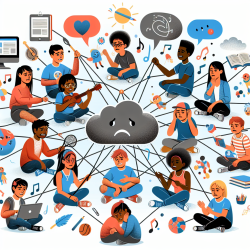Understanding the Power of Friendship Networks
Recent research has shed light on the intricate dynamics between friendship networks and depressive symptoms among adolescents, particularly those under chronic stress. The study titled "Being Popular or Having Popular Friends, Which Is Better? A Longitudinal Social Network Analysis of Depressive Symptoms among Chinese Adolescents under Major Chronic Stress" explores these relationships using a longitudinal social network analysis approach.
Key Findings from the Study
The study, conducted among 1062 Chinese adolescents preparing for the gaokao, a highly stressful college entrance exam, found that depressive symptoms negatively predicted future friendship popularity. However, having popular friends was associated with lower depressive symptoms. This suggests that while being popular might not directly impact one's mental health, having popular friends can serve as a protective factor against depression.
Implications for Practitioners
For practitioners working with adolescents, these findings emphasize the importance of fostering strong, supportive friendship networks. Here are some practical strategies:
- Encourage Social Integration: Facilitate group activities that promote interaction among students, helping them form connections with peers, especially those who are well-integrated socially.
- Identify Key Influencers: Recognize students who are popular within their peer groups and encourage them to include others in social activities, potentially reducing feelings of isolation among less popular students.
- Monitor Network Dynamics: Regularly assess the social dynamics within classrooms to identify changes in friendship networks that might impact mental health.
Encouraging Further Research
While this study provides valuable insights, further research is needed to explore the causal relationships between friendship dynamics and mental health outcomes. Practitioners are encouraged to collaborate with researchers to investigate these dynamics in different cultural contexts and stress environments.
Conclusion
The protective role of having popular friends highlights the potential of network-based interventions in reducing depressive symptoms among adolescents. By understanding and leveraging social networks, practitioners can create supportive environments that promote mental well-being.
To read the original research paper, please follow this link: Being Popular or Having Popular Friends, Which Is Better? A Longitudinal Social Network Analysis of Depressive Symptoms among Chinese Adolescents under Major Chronic Stress.










